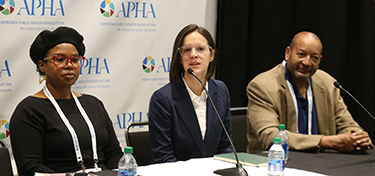The Hampton Roads area on the Chesapeake Bay in southeast Virginia is a tapestry of low-income Black populations serving the shipyards. Busy traffic corridors, industrial factories and rumbling tractor-trailers hauling goods for the ports are everywhere, all polluting the air.
At Monday’s APHA session “The Role of Environmental Health Professionals in Advancing Equity and Environmental Justice,” Garry Harris talked about the health harms experienced by community members due to the dangerously poor air quality in the region. Harris knows this well, as he grew up in Hampton Roads and suffers from chronic asthma.
 “All day long, you are breathing air pollution without knowing it,” he said.
“All day long, you are breathing air pollution without knowing it,” he said.
Low-income, marginalized communities are disproportionately exposed to health-harming toxins, often a legacy of redlining and systemic racism, said Harris, managing director of the Center for Sustainable Communities, based in Atlanta.
Hampton Roads residents experience high rates of chronic health conditions related to breathing polluted air. The Center for Sustainable Communities is documenting the health injustices in the communities and creating a strategic plan. Input from community members on their lived experiences is a key component.
“Rarely does anyone try to quantify these impacts and put together a plan to address them,” Harris said.
Also speaking at the session was April Ballard, assistant professor of environmental health at Georgia State University’s School of Public Health.
Ballard focused on the environmental injustices endured by unhoused people. Among the dangers are air pollution, contaminated water, noise pollution, rodents and insects, and street violence.
Criminalization of homelessness pushes people into dangerous environments, such as camping along railroad tracks, which, along with the noise pollution, has soil contaminated by asbestos and arsenic from train brakes.
Ballard called for more public health workers to do assessments of their local unhoused population, followed by including them in decisionmaking. This can lead to policies and approaches that improve lives.
“Justice must be achieved at the community and structural levels,” she said.
Fenika Miller, deputy national field director for Black Voters Matter Fund, discussed the importance of Black people exercising their voting rights in government elections.
In 2021, the group launched “Block Is Hot,” a 19-city Georgia tour that organizes block parties in underrepresented communities. Entertainment is offered between speakers informing people about environmental issues in communities. Community members become educated on the policy issues involved, enabling them to be more active politically and informed about positions of election candidates.
One community aided by the organization was able to lower its electric bills, which for some households were as much as $1,000 a month, by presenting objections to city leaders. Other communities have taken on clean air issues.
Miller emphasized that the organization is about empowering communities to take action to improve quality of life locally.
“We organize the organizer in communities and connect them with leaders,” Miller said. “We are not experts, but we are experts in organizing.”
Photo: Fenika Miller, April Ballard and Garry Harris. Photos courtesy EZ Event Photography.